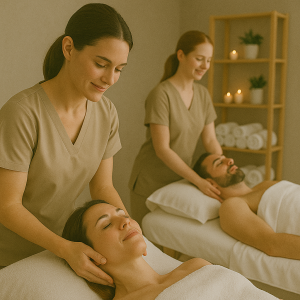 Touch is one of our most fundamental human needs. From the moment we’re born, physical contact plays an important role in emotional regulation, stress relief, and healthy development. Platforms like OPCMD help connect users in Korea to professional massage and wellness providers, making access to these vital services easier and more trustworthy.
Touch is one of our most fundamental human needs. From the moment we’re born, physical contact plays an important role in emotional regulation, stress relief, and healthy development. Platforms like OPCMD help connect users in Korea to professional massage and wellness providers, making access to these vital services easier and more trustworthy.
Neuroscience continues to reveal how therapeutic touch, through services such as massage at Korean spas, reflexology, and other relaxation treatments, positively impacts the brain and nervous system.
These services go beyond momentary comfort. They engage deep biological systems that influence mood, stress response, and sleep quality. Here’s what the science tells us about why relaxation services matter, and how they help us feel better, think clearly, and live healthier.
The Nervous System and the Stress Response
The body’s nervous system operates through two primary branches:
- The sympathetic nervous system governs the “fight or flight” response. It activates under stress, increasing the heart rate and releasing stress hormones, such as cortisol.
- The parasympathetic nervous system is essential for “rest and digest” functions. It slows the heart rate, reduces blood pressure, and promotes relaxation and healing.
Many massage and relaxation therapies activate the parasympathetic nervous system. A consistent, gentle touch, like what you receive during a massage, signals the body that it’s safe to relax. This shift away from a high-alert state toward calm can explain why clients often feel more centered, grounded, and even emotionally lighter after a session.
Touch and Brain Chemistry
When the skin is stimulated through safe, intentional touch, it sends signals to the brain via sensory neurons. These signals are processed in several brain regions, including:
- The somatosensory cortex, which interprets touch and pressure
- The limbic system regulates emotions and memory
One key hormone released during therapeutic touch is oxytocin, also known as the “bonding hormone.” Oxytocin fosters feelings of trust, comfort, and calm. These chemical shifts can improve emotional well-being, reduce anxiety, and elevate mood.
The Role of the Vagus Nerve
The vagus nerve serves as a communication channel between the brain and the body. It affects the heart, lungs, digestion, and other bodily functions. Stimulating the vagus nerve—either directly or through relaxation techniques—can lead to:
- A lower heart rate
- Reduced inflammation
- A deeper sense of calm
Massage and other slow, rhythmic touch therapies are believed to stimulate vagal activity indirectly. This effect is linked to improved emotional regulation, better digestion, and even enhanced immune function.
How Touch Improves Sleep
One of the most commonly reported benefits of massage and relaxation services is better sleep, and neuroscience helps explain why.
When stress is high, cortisol levels remain elevated. Massage helps reduce cortisol levels while increasing serotonin levels. It supports the production of melatonin, the hormone responsible for regulating sleep-wake cycles.
The result? Clients often experience deeper, more restorative sleep following massage therapy, especially when part of a regular self-care routine.
Emotional and Social Benefits
Touch is not just physical—it also carries powerful emotional and social meaning. In therapeutic settings, a respectful and professional touch can help individuals feel supported, cared for, and acknowledged. This is especially valuable for:
- Seniors who may experience isolation
- Individuals recovering from trauma
- People navigating emotional stress or grief
The emotional impact of touch can help reduce symptoms of depression, improve social connectedness, and reinforce a sense of personal worth and safety.
A Complement, Not a Cure
It’s essential to be clear: massage and relaxation services are not substitutes for clinical mental health care or medical treatment. But they can serve as powerful complements.
When integrated into a broader wellness strategy, services such as massage therapy, reflexology, and aromatherapy can support the nervous system, balance brain chemistry, and provide emotional relief in a safe and non-invasive manner. In today’s fast-paced world, these benefits are more relevant than ever.
In Summary
Neuroscience supports what many people have long known intuitively: touch is a powerful healing force. Through its impact on the nervous system and brain chemistry, therapeutic touch helps:
- Reduce stress
- Elevate mood
- Improve sleep
- Promote emotional balance
Whether you’re exploring massage, reflexology, or aromatherapy, using curated directories such as OPCMD ensures you’re engaging with licensed professionals who understand how to use therapeutic touch for maximum benefit.
